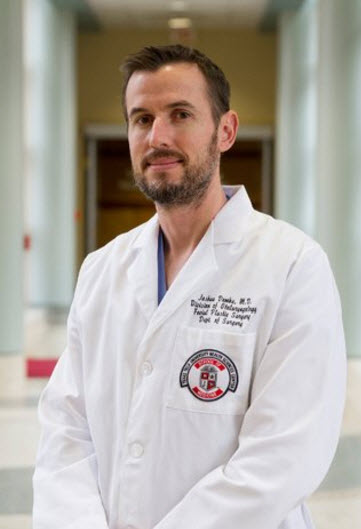My baby’s head looks flat?
Have you ever seen a baby with a helmet and wondered why the helmet? Have you or a friend had a child with some asymmetry or flattening of the head and wondered whether there was any cause for alarm or anything that needed to be done? Joshua Demke, M.D., a facial plastic and reconstructive surgeon from Texas Tech Physicians, said treatment is possible and depends on the severity of flattening and baby’s age at the time of evaluation.
“Positional plagiocephaly or deformational plagiocephaly is the term doctors use to describe flattening of the head as result of external force, usually the result of laying on the back of the head in the first months after delivery when a baby’s head is very moldable,” Demke said. “It is very common with 30 to 50 percent of all babies experiencing it in some fashion. Typically, one side is more flattened, though in some kids both sides of the back of the head can be affected, leading to a head that is shorter from front to back and wider from ear to ear.”

Neither of these forms of positional flattening affects a baby’s brain development or causes neurodevelopmental delays. In some instances, one of the neck muscles is congenitally stiff and leads to torticollis, in which the head tilts towards one shoulder and frequently causes the baby to favor sleeping on the opposite backside of the head. When torticollis is present neck physiotherapy or stretching exercises are usually needed to improve neck and head posture and in rare cases, Botox can be injected to relax the muscles of the neck on the affected side for three months, which can make physical therapy easier to perform.
What do you do if your baby’s head is flat? Demke said the earlier you notice, the
better. Make it a habit to inspect and feel your baby’s head early and regularly.
“You can minimize the chance of this developing by keeping your baby upright or off
the back of the head, and by rotating on which side of the back of the head they sleep,”
Demke said. “In the first four to five months of life before a baby learns to roll
over, the head is most likely to become flattened if you aren’t careful, but it will
most likely improve with “repositioning maneuvers.”
After about six months of age repositioning maneuvers are less effective. If severe
flattening persists beyond six months of age, then your physician may refer you to
an orthotist for an orthotic molding helmet or band, which is adjusted once or twice
a month over the course of therapy to affect change in a baby’s head shape.
“Helmets are most effective when worn 23 plus hours a day for three to six months
and are less effective when used after a year of age,” Demke said. “The likelihood
of persistent asymmetry or flattening despite helmet use depends on when the helmet
was started, how compliant you are with using the helmet, and how many months of use.”
Rarely, if there is concern of other head shape issues, your pediatrician may refer
you to a pediatric neurosurgeon or pediatric plastic surgeon to rule out other head
shape abnormalities like craniosynostosis.
If you have questions or concerns about your baby’s head shape, visit with your baby’s
physician. The key to treating any type of head deformity is early diagnosis and intervention.
Related Stories
Celebrating Veterans: TTUHSC’s General Martin Clay’s Legacy of Service and Leadership
From his initial enlistment in the Army National Guard 36 years ago to his leadership in military and civilian health care management roles, Major General Martin Clay’s career has been shaped by adaptability, mission focus and service to others.
Texas Tech University Health Sciences Center School of Nursing Named Best Accelerated Bachelor of Science in Nursing Program in Texas
The TTUHSC School of Nursing Accelerated Bachelor of Science in Nursing (BSN) program has been ranked the No. 1 accelerated nursing program in Texas by RegisteredNursing.org.
TTUHSC Names New Regional Dean for the School of Nursing
Louise Rice, DNP, RN, has been named regional dean of the TTUHSC School of Nursing on the Amarillo campus.
Recent Stories
National Academy of Inventors Names TTUHSC Faculty Senior Members
The National Academy of Inventors (NAI) has designated two current and one former TTUHSC faculty researchers as Senior Members.
The John Wayne Cancer Foundation Surgical Oncology Fellowship Program at Texas Tech University Health Sciences Center Announced
TTUHSC is collaborating with the John Wayne Cancer Foundation and has established the Big Cure Endowment, which supports the university’s efforts to reduce cancer incidence and increase survivability of people in rural and underserved areas.
TTUHSC Receives $1 Million Gift from Amarillo National Bank to Expand and Enhance Pediatric Care in the Panhandle
TTUHSC School of Medicine leaders accepted a $1 million philanthropic gift from Amarillo National Bank on Tuesday (Feb. 10), marking a transformational investment in pediatric care for the Texas Panhandle.
